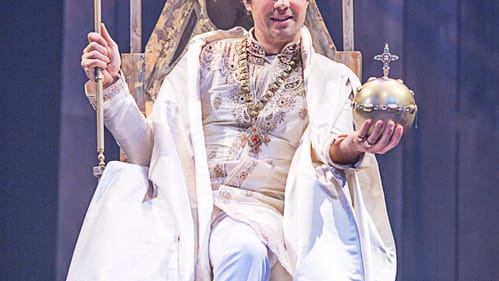Stay in the Loop
BSR publishes on a weekly schedule, with an email newsletter every Wednesday and Thursday morning. There’s no paywall, and subscribing is always free.
The hollow crown
Pennsylvania Shakespeare Festival presents 'Richard II'

Once an outlier within Shakespeare’s canon, Richard II has gained in prominence over the past decade, with directors and performers drawn to the play’s fine poetry and nuanced explorations of monarchical power struggles. Pennsylvania Shakespeare Festival tries its hand at the play for the first time, styled here as King Richard II, but the resulting production by Gina Lampanella rarely scratches the surface of the complicated king and his tragic downfall.
Richard ascended the throne at age 10; Shakespeare’s tragedy chronicles the final two years of his rule (and his life). As played by Christian Coulson with an ever-present sneer and a bleating whine, the adult ruler seems as petulant and temperamental as a spoiled child.
Baby talk
Many of Richard’s actions support presenting him as an overgrown man-baby — the fickleness with which he bestows and withdraws favor among friends, his spendthrift financial habits — but Coulson’s interpretation shows no growth as his fate becomes more dire.
Without a notable change in Richard’s character, his journey simply charts from capricious king to capricious corpse. Yet that seems to be all the thought Lampanella and Coulson bring to the drama’s most chilling moments.
Richard laughs off the rising rebellion of his usurping cousin Bolingbroke (Justin Adams), but one senses little growing fear behind this casual dismissal. When Richard instructs his few remaining partisans to “sit upon the ground and tell sad stories about the death of kings,” Coulson snivels like a toddler denied ice cream.
Likewise, as depicted by his final moments in the dungeon at Pomfret Castle, the now-deposed monarch seems to have learned little from his misadventure. When Bolingbroke, upon learning of Richard’s slaying, remarks, “Though I did wish him dead / I hate the murderer, love him murdered,” the final burnishing of the late king’s memory rings hollow. In this staging, Richard does little to earn such a pronouncement, much less the audience’s goodwill.
Lampanella also fails to pull together Shakespeare’s various threads into a unified dramaturgical whole. Near the top of the play, the dying John of Gaunt (Christopher Council) grieves the waning of England’s glory; the play surrounds Bolingbroke’s quest to restore honor to the throne as much as it chronicles Richard’s fatal flaws. The production falters by never establishing a consistent tone as Bolingbroke executes his holy insurrection.

Some fault lies in Adams’s listless performance, which inspires little confidence in his abilities to unseat the slyly mercurial sovereign. Bolingbroke’s stirring speeches turn to marbles in his mouth.
Tragic Neil Simon
But more often, Lampanella stages scenes for high comedy or bathetic melodrama, as though she had hack material to work with. William Neal’s intrusive soundscape — a mix of blaring coronets, thumping basses, and snatches of modern newscasts — further dulls the power of several pivotal scenes by too nakedly telegraphing their subtext.
This approach blunts some of the drama’s more thrilling moments. How can the shifting loyalties and potentially treasonous behavior of the Duke of Aumerle (otherwise well-played by Brandon J. Pierce) take on appropriate weight when the discovery of his duplicitousness is played as broadly as Neil Simon? As Aumerle’s parents, the Duke and Duchess of York (Wayne S. Turney and Starla Benford), quarrel over whether to turn their son over to Bolingbroke (now King Henry IV), Lampanella instructs them to bicker like a sitcom couple on a bad date.
Some performers rise above the confused aesthetic. Christopher Patrick Mullen brings dignity and rich diction to the rebel Earl of Northumberland; Benford does mercifully restrained work, rejecting the histrionics imposed on her by the production. Jo Twiss impresses in her one scene as the widowed Duchess of Gloucester — though her return as the Bishop of Carlisle, played as a woman, makes little sense.
On the whole, though, the same cast that seemed so loose and lively in Shakespeare in Love (which plays in repertory with this production, on Daniel Conway’s malleable set) now come across as stiff and workmanlike. It’s not for lack of talent, as their past performances show. But whereas Patrick Mulcahy pulled together outstanding ensemble cohesion in the service of a weaker script, Lampanella lets Shakespeare’s gorgeous and timely tale wither in a mishmash of missed opportunities.
What, When, Where
King Richard II. By William Shakespeare, Gina Lampanella directed. Through August 5, 2018, at Pennsylvania Shakespeare Festival, 2755 Station Avenue, Center Valley, Pennsylvania. (610) 282-WILL or pashakespeare.org.
Sign up for our newsletter
All of the week's new articles, all in one place. Sign up for the free weekly BSR newsletters, and don't miss a conversation.

 Cameron Kelsall
Cameron Kelsall